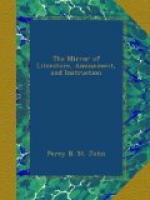(For the Mirror.)
It is thine—it shall win thee
a wreath for thy brow
When thy spirit seems more energetic than
now;—
It is thine in the war-cloud of gloom
and of fire,
The pride of thy kindred—the
sword of thy sire!
It is thine—let the bright
rose around it entwine,—
Let it glance in the sunbeam which smiles
on the shrine,
And sheathe it triumphant when cravens
retire,
The pride of thy household—the
sword of thy sire!
It is thine—but the warrior
who bore it is laid
Where the rose throws its balm, and the
cypress its shade,
And churls and marauders have ceased to
retire
From the star of the battle—the
sword of thy sire!
It is thine—thou shall wave
it with banner and plume
When the trumpet is heard in the war-cloud
of gloom:
It is thine to defend thee when rebels
conspire,
The choice of thy childhood—the
sword of thy sire!
Deal.
G.R.C. OR, REGINALD AUGUSTINE.
* * * * *
SPIRIT OF THE PUBLIC JOURNALS.
* * * * *
MAVROVITCH, THE POLE.
“There are more things in heaven
and earth, Horatio,
Than are dreamt of in your philosophy.”
It seems that Valodimir Mavrovitch, the fratricide, was the second son of Count Baileskow, the representative of one of the oldest and most renowned families in Poland. In his youth, Valodimir was the most elegant boy almost ever seen, and scarcely less remarkable for talent than beauty; but he had a peculiar enthusiasm about him, in which, as his tutor, Father Theophilus, often said, lay his destiny. “In all other respects, he is only,” said the father, “a nobler youth than common; but in this singular endowment he has something supernatural to man. He is without fear—he knows not what it is; and, with a dexterity inconceivable, accomplishes the most abstruse and difficult purposes. In his lessons, such is his aptitude, that he learns as if he had brought knowledge with him into the world; and in field-sports, the chase, and all exercises, he possesses an ardour and courage by which he outstrips every competitor. His generosity is equally unbounded; and whatever he undertakes is pursued with an indefatigable eagerness that knows not impediment; but amidst this unexampled energy in purpose there is cause for fear. It matters not to him, when once interested, whether his object be good or bad; and in this fatal inability to discriminate the value of his aims lies his danger.”
(We are compelled considerably to abridge this story to suit our limits.—The mystical portion of it, or “the story of the Demon,” as the narrator, a Pole, calls it, is thus told to an English tourist:)—
“When I was on the eve of my departure from the castle of Baileskow, my paternal inheritance, and the residence of my mother, to make a tour through Germany and Italy, the carriage being at the gate, and the servants with torches around—for it was then before the dawn of day—as I crossed the court from the hall-door to embark, an old man met me. He had the air of a priest, but not exactly the garb, and his eyes, I thought—or it might be an after fancy—were luminous.




